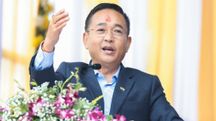Sikkim aims to become fully literate state by 2027: CM Tamang
Sikkim aims to achieve full literacy by 2027 through enhanced education and adult learning initiatives. CM Prem Singh Tamang stresses the importance of literacy for overall development and urges collaboration
 Sikkim aims to become fully literate state by 2027: CM Tamang
Sikkim aims to become fully literate state by 2027: CM TamangChief Minister Prem Singh Tamang has set ambitious development targets for Sikkim over the next 50 years, including achieving complete literacy by 2027, noting that the state currently has a literacy rate above 90 per cent. He said that, as per the new education policy, Sikkim ranks number one.
Speaking at the India Today Conclave State of the States – Sikkim @ 50 held in New Delhi, he announced plans to establish more universities so that students from Sikkim will no longer need to go outside the state for higher education, and instead, students from other parts of the country will come to Sikkim to study.
Tamang further outlined his vision for transforming the Himalayan state into one of India's most prosperous regions. "By 2027, we aim to make Sikkim a fully literate state," he announced, highlighting education as a cornerstone of his administration's second-term agenda.
The Chief Minister's confidence stems from remarkable public support demonstrated in recent elections. "Out of 32 seats, we won 31 seats. The one seat won by the opponent happens in a democracy. That MLA who won in that one seat is also now part of our party. So now, we have all 32 MLAs," Tamang said, describing an almost complete political consensus rare in Indian democracy.
Sikkim's development trajectory has accelerated significantly since 2019, when Tamang first assumed office. Despite facing the COVID-19 pandemic during his initial term, his administration focused on critical infrastructure and social sectors. The state now boasts dialysis centres in every district hospital and cancer treatment facilities - amenities that were completely absent before 2019.
"Before 2019, there was not even one dialysis centre or cancer treatment facility in Sikkim. But soon after coming to power, we started dialysis centres in every district hospital, and cancer treatment is now available," the Chief Minister explained.
Railway connectivity, long awaited by Sikkimese residents, will finally arrive in 2026. This development promises to revolutionise tourism and economic opportunities in the state. "From next year, 2026, our train services will start. This will make our state even more beautiful and prosperous," Tamang said, crediting central government support for overcoming previous administrative hurdles.
The state's economic performance reflects successful governance, with per capita income reaching Rs 7,007,181 - among India's highest. Sikkim currently ranks fourth nationally in poverty reduction efforts, with the Chief Minister targeting complete poverty elimination.
Environmental conservation remains central to Sikkim's development model through innovative schemes like "Mero Rukh Mero Santati" (My Tree, My Legacy). This programme creates emotional connections between families and forest conservation by encouraging tree planting linked to significant life events.
"The phrase means 'My tree is my legacy' in Nepali. We started this to preserve the environment and connect people emotionally with nature," Tamang explained, noting that the Forest Department issues certificates to families who participate in the planting program.
Entrepreneurship receives significant government support through the "One Family, One Entrepreneur" initiative and the Chief Minister's Employment Assistance Scheme, which provides 100% grants for small ventures. These programs work alongside subsidised loans from the State Bank of Sikkim and nationalised banks to foster economic growth.
Tamang's political journey began unexpectedly in 1994 when he initially resisted entering politics. "My ambition was never to join politics. In 1994, when I was declared a candidate by the party, I actually went to return the ticket. I had told them clearly—I'm not interested in politics," he recalled, describing his transition from teaching to public service as coincidental.
Looking toward Sikkim's centenary of merger with India in 2075, Tamang participated in a time capsule ceremony at Paljor Stadium, though he maintains secrecy about his message for future generations. "If I disclose that today, the time capsule will lose its value. In 2075, when Sikkim completes 100 years, the message will be read then," he said.
The Chief Minister's development priorities align with Prime Minister Modi's vision for India 2047, focusing on connectivity, education, healthcare, and employment generation. Central government support has been crucial, with Tamang noting that ministers visit every 15 days, contrasting sharply with pre-2014 neglect of northeastern states.
Copyright©2026 Living Media India Limited. For reprint rights: Syndications Today









